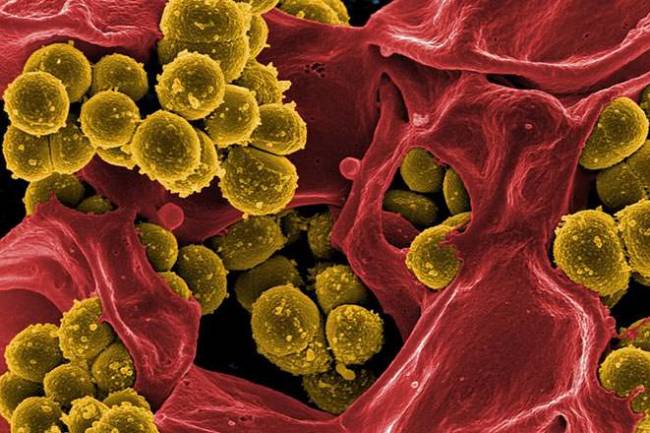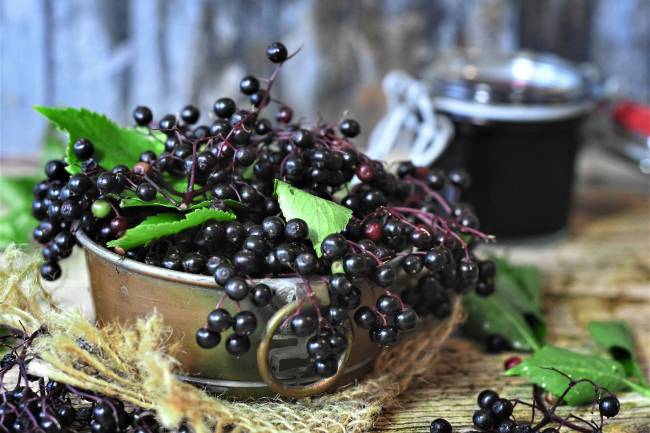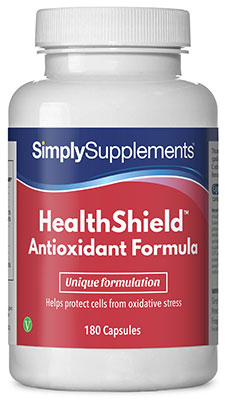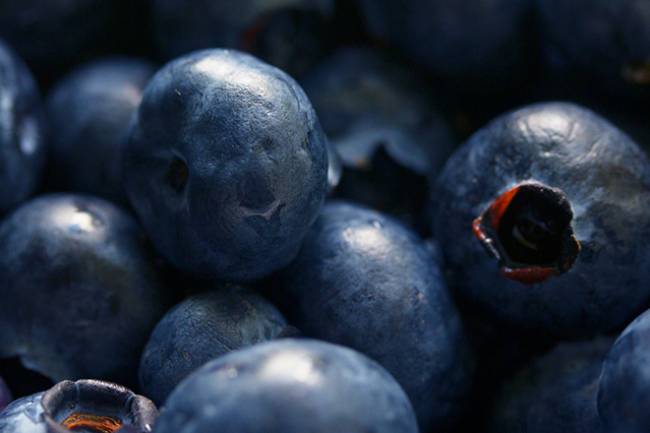What Are Antioxidants and What Do They Do?

Despite how common the word antioxidant is, a lot of people are unfamiliar with what they are, how they work and how they might be able to help your health. To counter this problem, we've put together this helpful article to give you a comprehensive understanding of antioxidants and why they are important for the health of your body.
What Are Antioxidants and What Do They Do?
Antioxidants are substances that help to defend all areas of your body from the threat posed by free radical molecules. They are naturally occurring compounds found in a variety of different fruits, vegetables and foods, but they can also be man-made and added to different skincare creams, gels or supplements as another way of introducing them to the body.
What Are Free Radical Molecules?
Normal molecules have an even number of electrons, whereas free radical molecules possess a lone, un-paired electron. This causes the free radical molecule to look to steal another electron from other molecules in order to create an even pair. However, the stable molecules that are usually in the firing line of free radicals are ones that, atomically, can make up different components in your body's cells.
This theft of electrons performed by free radicals is a process called oxidation and the damage that is caused to the cells because of this process is known as oxidative damage or oxidative stress. Interestingly, oxidation is also a process used by the body, in a small capacity, to generate an inflammatory response to combat harmful contagions that pose a risk to your health. “The generation of ROS (reactive oxygen species) in a limited dose is one of the process induced by the immune system to destroy microbial pathogens and viruses.”
The process of oxidation and oxidative stress are commonly linked with a variety of different health problems, including:
- Multiple different forms of cancer
- Heart health issues like atherosclerosis and diabetes
- Eye health complications and the degradation of eye sight
- Joint health issues like arthritis
When a free radical steals an electron from one of your own molecules, the role of unstable to stable is transferred. This in turn causes your once-healthy molecule to become a threat to the other cells and molecules around it, causing a chain of stolen electrons and damaged cells. This chain reaction can have particularly disastrous results if left to progress unchallenged.
How Do Antioxidants Combat Oxidative Stress?
Antioxidants possess the unique ability to be able to donate electrons without sacrificing their own stability, meaning that they can pacify a free radical without any real consequences. Because of this ability, you may often hear antioxidants referred to as free radical scavengers.
What Are the Benefits of Antioxidants?
There are a variety of different antioxidants, with each one having its own unique composition and use within the body to help combat the damage free radical molecules can cause. Let's take a look at five of the most prominent.
Vitamin A and Beta Carotene
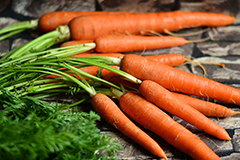 Vitamin A is an antioxidant vitamin that can be sourced from both plants and animal foods. Vitamin A found sourced from animals is known as preformed vitamin A, which is also called retinol. Plants, however contain pro-vitamin A, of which the most common type is beta carotene. Thankfully, your body is able to convert beta carotene into retinol, meaning that people who have chosen to adopt different diets based on their lifestyle choices don't have to worry about missing out on either of these varieties of vitamin A. Some sources of pre-formed vitamin A include:
Vitamin A is an antioxidant vitamin that can be sourced from both plants and animal foods. Vitamin A found sourced from animals is known as preformed vitamin A, which is also called retinol. Plants, however contain pro-vitamin A, of which the most common type is beta carotene. Thankfully, your body is able to convert beta carotene into retinol, meaning that people who have chosen to adopt different diets based on their lifestyle choices don't have to worry about missing out on either of these varieties of vitamin A. Some sources of pre-formed vitamin A include:
- Dairy products like milk, cheese and eggs
- Liver
- Oily fish like mackerel, salmon and sardines
Some sources of beta carotene include:
- Orange pigmented foods like carrots, sweet potato, red peppers and pumpkin
- Leafy green vegetables like spinach and lettuce
- Cantaloupe melon
Although some of the reported benefits of vitamin A in the body include the formation of healthy bones, skin and teeth, and immune system support, its use in maintaining healthy vision is reinforced with scientific literature. A large-scale study called The Age-Related Eye Disease Study (AREDS) conducted in the US in 2001 looked to analyse the effects of different antioxidants and zinc against age-related macular degeneration (AMD).
A clinical trial was performed on a sample of 3,600 participants, each of whom were subject to different formulations of nutrients to determine the effectiveness of different vitamins and minerals to try to combat this eye health issue. Included in the final formulation was vitamin C, beta carotene, vitamin E, zinc and copper. Following extensive analysis, the researchers ultimately concluded that “taking high levels of antioxidants and zinc can reduce the risk of developing advanced AMD by about 25%.”
Another study conducted in 1993 looked to analyse the effects of vitamin A on retinitis pigmentosa, a genetic disorder that causes cells in the retina to break down. 601 participants aged 18 to 49 were randomly assigned into four different research groups:
1. Received 15,000 iu/d of vitamin A
2. Received 15,000 iu/d of vitamin A with 400iu/d of vitamin E
3. Received trace amounts of both
4. Received only 400iu/d of vitamin E
The study lasted for a duration of 4 to 6 years, during which time variables such as visual field area and visual acuity were measured annually. The results found that “the two groups receiving 15,000 iu/d of vitamin A had on average a slower rate of decline of retinal function than the two groups not receiving this dosage.”
Vitamin C
Vitamin C is undoubtedly the most popular and well-known antioxidant available, partly due to the fact that it can be found in a huge variety of different fruits and vegetables. Including:
- Leafy green vegetables like kale and spinach
- Strawberries, blueberries and blackberries
- Citrus fruits like oranges, lemons, limes, grapefruit
- Papaya
- Potatoes
- Yellow peppers
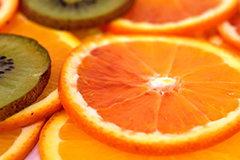 Amongst its many uses within the body, the European Food Safety Authority has authorised the health claims that “vitamin C contributes to the normal function of the immune system” and “contributes to the protection of cells from oxidative stress.” Vitamin C, also known as ascorbic acid, is not produced naturally in the body and has to be ingested through the diet in order for you to obtain the necessary dose each day. However, although oxidative stress is believed to be a contributing factor to the onset of diseases and bacterial infections, vitamin C is not known to be able to actively combat them and the oxidation they can cause.
Amongst its many uses within the body, the European Food Safety Authority has authorised the health claims that “vitamin C contributes to the normal function of the immune system” and “contributes to the protection of cells from oxidative stress.” Vitamin C, also known as ascorbic acid, is not produced naturally in the body and has to be ingested through the diet in order for you to obtain the necessary dose each day. However, although oxidative stress is believed to be a contributing factor to the onset of diseases and bacterial infections, vitamin C is not known to be able to actively combat them and the oxidation they can cause.
An article, published in 2003 titled ‘vitamin C as an antioxidant: evaluation of its role in disease prevention', reviewed past studies and the use of vitamin C to help lower risks of cardiovascular disease, stroke and cancer. The article stated that “intervention studies with vitamin C have shown no change in markers of oxidation or clinical benefit.” Scientific study looking at the antioxidant properties of vitamin C for human health is also lacking. Despite this, ensure that you meet the recommended daily intake of 40mg for adults aged 19-64 to help support the overall health and wellbeing of your immune system, which relies on different vitamins and minerals to remain optimal. Don't, however, expect vitamin C to work like a medicine that will directly combat symptoms.
Vitamin E
Vitamin E has grown to become very popular as a dietary supplement because of its known role as a powerful antioxidant, where it helps to protect the body's cells, tissue and organs against oxidative damage. It is recommended that men should aim to get 4mg of vitamin E a day, whereas women are advised to get 3mg . Although this is easily achievable through the diet in most western nations, vitamin E is very commonly found in supplement form. Vitamin E is found in a plethora of different foods, giving you a lot of opportunities to work it into your diet. These foods include:
- Sunflower, safflower, corn, soya and wheat germ oils
- Hazelnuts and peanuts
- Almonds
- Sunflower seeds
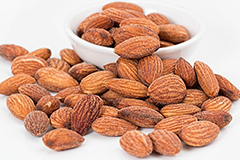 Just like vitamin C, the European Food Safety Authority have approved the health claim that vitamin E “contributes to the protection of cells from oxidative stress.” Vitamin E is fat-soluble, meaning that your body is able to store excess amounts that aren't immediately used. Its reputation as a beneficial antioxidant to protect the health of the human heart has also received thorough scientific investigation and study, reinforcing the benefits it can have on your health and body.
Just like vitamin C, the European Food Safety Authority have approved the health claim that vitamin E “contributes to the protection of cells from oxidative stress.” Vitamin E is fat-soluble, meaning that your body is able to store excess amounts that aren't immediately used. Its reputation as a beneficial antioxidant to protect the health of the human heart has also received thorough scientific investigation and study, reinforcing the benefits it can have on your health and body.
A study published in 1993 looked to analyse the relationship between vitamin E consumption and the risk of coronary heart disease in men. The scientists gathered data in 1986 from 39,910 US male health professionals aged 40 to 75 who were free from coronary heart disease. Each participant completed dietary questionnaires detailing their regular intake of vitamin C, carotene and vitamin E. The results showed that “a lower risk of coronary disease among men with higher intakes of vitamin E.”
A replicated study conducted by the same authors as the above experiment looked to analyse the same relationship between vitamin E intake and coronary heart disease in women. The same methodologies were used as the previously discussed study, with 87,245 female nurses aged 34 to 59 completing a dietary questionnaire. This study drew identical conclusions to the study completed involving male participants, with the authors stating that “the use of vitamin E supplements is associated with a reduced risk of coronary heart disease.”
Selenium
 The last antioxidant you need to be aware of is selenium. Despite the fact that it is categorised as a trace mineral, meaning that you only need small amounts of it, it has been suggested that selenium may be able to help maintain a healthy immune system, support the production of normal skin and hair, and promote healthy thyroid function. Due to these perceived benefits, selenium is regularly added to different foods and crops as a fortifying agent. Unlike vitamin C, your body is able to store selenium, 46% of which may be found in the skeleton.
The last antioxidant you need to be aware of is selenium. Despite the fact that it is categorised as a trace mineral, meaning that you only need small amounts of it, it has been suggested that selenium may be able to help maintain a healthy immune system, support the production of normal skin and hair, and promote healthy thyroid function. Due to these perceived benefits, selenium is regularly added to different foods and crops as a fortifying agent. Unlike vitamin C, your body is able to store selenium, 46% of which may be found in the skeleton.
Like its reported uses, food sources of selenium are just as varied, including:
- Brazil nuts
- Fish and seafood like sardines, halibut and shrimp
- Meat like turkey, chicken and steak
- Brown rice
However, despite the claims that are regularly made about the benefit of selenium, there is very little scientific evidence to verify the science behind its reputation as an antioxidant. In some cases, the science even solidifies the fact that too much selenium can have detrimental effects on your health.
A study conducted in the US in 2007 looked to see the effects of long-term selenium supplementation on Type 2 Diabetes. 1,202 participants who didn't have type 2 diabetes at the beginning of the experiment were given a 200μg/d oral supplement or a placebo. The occurrence of diabetes was then recorded through follow up consultations. The results found that “during an average follow-up of 7.7 years, type 2 diabetes developed in 58 selenium recipients and 39 placebo recipients.” The researchers also found that this trend continued when factors like ages, sex, body mass index and smoking status were included. The study concluded that “selenium supplementation does not seem to prevent type 2 diabetes, and it may increase risk for the disease.” Despite the lack of science behind the benefits of selenium, it is recommended that adults aged 19 to 65 should aim to intake 75mg per day to help keep your immune system topped up with vitamins. However, be careful when turning to selenium supplements to address potential deficiencies because, like we just discussed, it could be harmful.
Summary
In this article, we've taken an in-depth look at what antioxidants are, how they work and how you can make sure that you receive enough of 5 very specific ones on a daily basis. However, despite the multiple positive claims that are frequently made about antioxidants, this is very often a blanket statement that doesn't incorporate the science that has been conducted on each individual substance. With that in mind, we highly suggest that before adopting a new regime that focuses on antioxidant intake, you should conduct your own extensive research or consult your local GP for professional advice.
Sources:
https://www.ncbi.nlm.nih.gov/pmc/articles/PMC2698273/
https://jamanetwork.com/journals/jamaophthalmology/article-abstract/640248?redirect=true
https://www.ncbi.nlm.nih.gov/pubmed/12569111
https://www.nhs.uk/conditions/vitamins-and-minerals/vitamin-e/
http://www.nejm.org/doi/full/10.1056/nejm199305203282004
http://www.nejm.org/doi/full/10.1056/nejm199305203282003
http://annals.org/aim/fullarticle/736271
https://www.nutrition.org.uk/attachments/article/261/Nutrition%20Requirements_Revised%20Oct%202017.pdf

 Nicole
Nicole 
